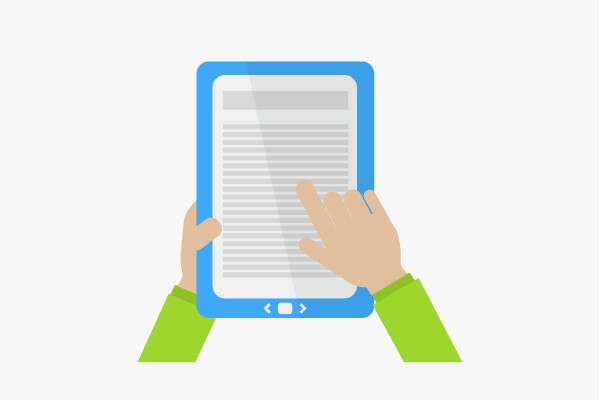eBook
An eBook is an electronic book or digital book that can be read by a user as a file in a certain format, such as pdf, epub, awz, lit or mbp. In a broader sense, the term eBook also refers to the object required for this purpose, i. e. a program or terminal device that displays the file in its respective format. EBooks are based on books in many ways: Table of contents, structure and formatting are usually based on the book templates, but eBooks also offer certain functions that books do not have, such as a full text search or jumping to a chapter through links.
History
The origins of eBooks can be traced back to 1971: the Gutenberg project aims to make important historical texts available in electronic form. Although these were not yet actual eBook formats, this was in principle the birth of the electronic book. The increased use of electronic texts by universities contributed significantly to the fact that texts and books in digital form became increasingly important. eBooks were particularly practical when working with scientific texts, as they made it easier to quote and paraphrase parts of texts that otherwise had to be manually searched for and written down. However, eBooks only became commonplace when devices were developed for e-Book use, and e-books therefore became cheaper and more pratical.
Types
eBooks are available in both free and paid format, with some publishers offering rental models. eBooks can be read online, but they are limited to a certain number. When purchasing eBooks, the prices range from one to ten euros, whereby the prices are based on the scope and subject area of the eBook. When buying it is necessary to pay attention to the appropriate format
The problem with many eBooks is the rights management, which is based on DRM (Digital Rights Management). Like other artistic products, EBooks also enjoy a copyright. To protect it, some eBook readers are equipped with protection devices, copy protection or other barriers. This can lead to complications when used with certain devices or programs. The eBook may need to be converted to a different format.
Significance for SEO
EBooks can be used as part of a content marketing strategy and for search engine optimization. This serves different purposes, the most obvious being branding, demonstrating expertise, reputation and image. However, an eBook can also be used as a stepping stone for web presence, especially when seen as a reference to a particular topic: If the eBook and the URL associated with it are regarded as an expert resource, it will probably become a keyword to be found on the top positions in the SERPs - provided that it offers this expertise in a readable form.
Such eBooks should be targeted at the respective target group, and should provide useful information. As a resource for high-quality information, an eBook can treat a topic in detail. The information relevant for the readers should be able to be reached quickly and easily, for example with jump marks in the document. Of course, further links to the creator of the eBook can be placed to increase page views of a certain web presence and other KPIs.[1]
References
- ↑ The eBook’s eBook: Build SEO with an eBook. dsearchenginejournal.com . Accessed on April 23, 2014.

